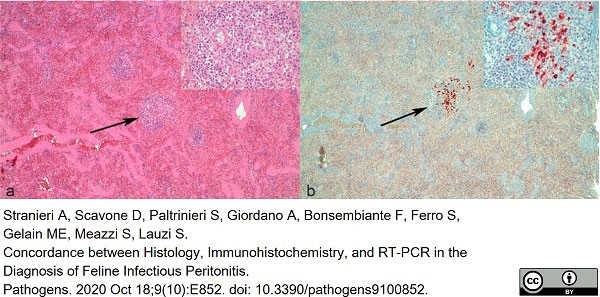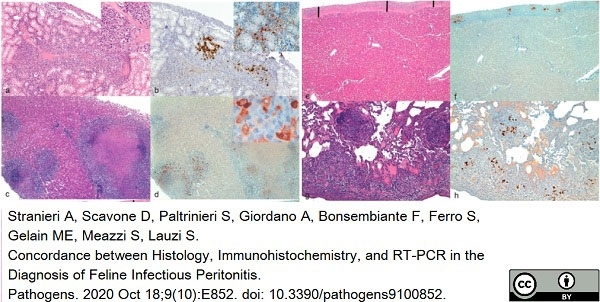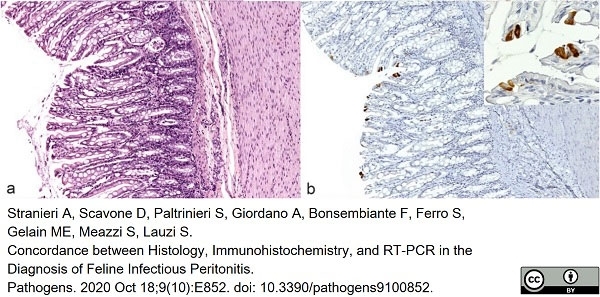Coronavirus antibody | FIPV3-70



Mouse anti Feline Coronavirus
- Product Type
- Monoclonal Antibody
- Clone
- FIPV3-70
- Isotype
- IgG2a
- Specificity
- Coronavirus
| Mouse anti Feline Coronavirus antibody, clone FIPV3-70 reacts with feline infectious peritonitis virus (FIPV) type 1 and 2 and is specific for the nucleocapsid. It is also known to react with canine coronavirus (CCV), pig coronavirus transmissible gastroenteritis virus (TGEV) and ferret coronavirus. Some specific activity has been detected against bovine coronavirus (BCV). Mouse anti Feline Coronavirus antibody, clone FIPV3-70 does not recognize Feline Leukemia virus, Feline Immunodeficiency virus, Feline Calcivirus, Feline Herpes virus, Canine Adenovirus (type 2), Canine Distemper virus, Canine Parvovirus and Canine Parainfluenza virus. It has been reported that clone FIPV3 recognizes the SARS-Cov-2 core protein (Nardacci et al. 2020). |
- Target Species
- Viral
- Product Form
- Purified IgG - liquid
- Preparation
- Purified IgG prepared by affinity chromatography on Protein A from tissue culture supernatant
- Buffer Solution
- Phosphate buffered saline
- Preservative Stabilisers
- < 0.1% sodium azide (NaN3)
- Immunogen
- Coronavirus cocktail.
- Approx. Protein Concentrations
- IgG concentration 1.0 mg/ml
- Regulatory
- For research purposes only
- Guarantee
- 12 months from date of despatch
Avoid repeated freezing and thawing as this may denature the antibody. Storage in frost-free freezers is not recommended.
| Application Name | Verified | Min Dilution | Max Dilution |
|---|---|---|---|
| ELISA | |||
| Flow Cytometry | |||
| Immunofluorescence | |||
| Immunohistology - Frozen | |||
| Immunohistology - Paraffin 1 | |||
| Western Blotting |
- 1This product requires antigen retrieval using heat treatment prior to staining of paraffin sections.Sodium citrate buffer pH 6.0 is recommended for this purpose.
- Western Blotting
- Under reducing conditions Mouse anti Feline Coronavirus antibody, clone FIPV3-70 detects a band of 50-56 kDa that represents the nucleocapsid.protein and an additional band 46 kDa in reducing gels with CCV as antigen.
| Description | Product Code | Applications | Pack Size | List Price | Your Price | Quantity | |
|---|---|---|---|---|---|---|---|
| Rabbit F(ab')2 anti Mouse IgG:HRP (Human Adsorbed) | STAR13B | C E P RE WB | 1 mg |
|
Log in | ||
| List Price | Your Price | ||||||
|
|
Log in | ||||||
| Description | Rabbit F(ab')2 anti Mouse IgG:HRP (Human Adsorbed) | ||||||
| Goat anti Mouse IgG:FITC (Rat Adsorbed) | STAR70 | F | 0.5 mg |
|
Log in | ||
| List Price | Your Price | ||||||
|
|
Log in | ||||||
| Description | Goat anti Mouse IgG:FITC (Rat Adsorbed) | ||||||
References for Coronavirus antibody
-
Suderman, M.T. et al. (2006) Three-Dimensional Human Bronchial-Tracheal Epithelial Tissue-Like Assemblies (TLAs) as Hosts For Severe Acute Respiratory Syndrome (SARS)-CoV Infection
NASA/TP–2006–213723 -
Vogel, L. et al. (2010) Pathogenic characteristics of persistent feline enteric coronavirus infection in cats.
Vet Res. 41 (5): 71. -
Michimae, Y. et al. (2010) The First Case of Feline Infectious Peritonitis-like Pyogranuloma in a Ferret Infected by Coronavirus in Japan.
J Toxicol Pathol. 23 (2): 99-101. -
Meazzi, S. et al. (2019) Feline gut microbiota composition in association with feline coronavirus infection: A pilot study.
Res Vet Sci. 125: 272-8. -
Cony, F.G. et al. (2019) Clinical and pathological aspects of idiopathic pulmonary fibrosis in cats
Pesquisa Veterinária Brasileira. 39 (2): 134-41. -
Stranieri, A. et al. (2020) Preliminary investigation on feline coronavirus presence in the reproductive tract of the tom cat as a potential route of viral transmission.
J Feline Med Surg. 22 (2): 178-85. -
Stranieri, A. et al. (2020) Concordance between Histology, Immunohistochemistry, and RT-PCR in the Diagnosis of Feline Infectious Peritonitis
Pathogens. 9 (10): 852. -
Pekkarinen, H. et al. (2018) Non-tuberculous Mycobacteria can Cause Disseminated Mycobacteriosis in Cats.
J Comp Pathol. 160: 1-9.
View The Latest Product References
- RRID
- AB_323968
MCA2194
If you cannot find the batch/lot you are looking for please contact our technical support team for assistance.
Please Note: All Products are "FOR RESEARCH PURPOSES ONLY"
View all Anti-Viral ProductsAlways be the first to know.
When we launch new products and resources to help you achieve more in the lab.
Yes, sign me up

